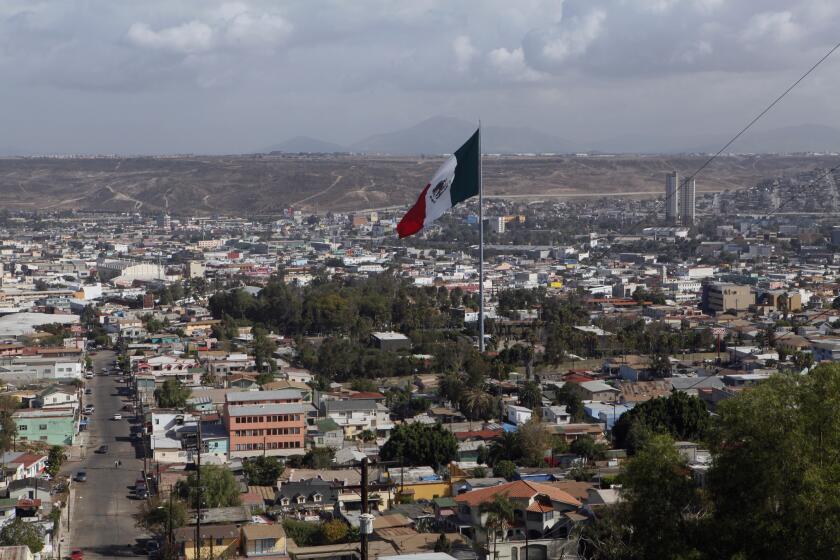Suspension of water service for 600,000 people?
Some 600,000 residents of Tijuana and Rosarito Beach can expect to see their water deliveries shut off as soon as next weekend as a major aqueduct undergoes repairs.
The shutdown, which could last from two to five days, will affect just less than one-third of the area’s 1.8 million water users living in 332 colonias, or neighborhoods, across the western and southern parts of Tijuana and northern Rosarito Beach, according to the Baja California Public Service Commission, or CESPT.
“We are sending out notice in advance, so that people know not to perform tasks that consume a lot of water, such as using washing machines,” during the service suspension, said Miguel Lemus, general manager of the CESPT, which serves both Tijuana and Rosarito Beach.
An announcement on the timing could be forthcoming as early as next week, and the agency is asking users to stay updated through its Facebook page, “Comisión Estatal de Servicios Públicos de Tijuana.”
Lemus said workers would begin operations on a Friday, and work around the clock in order to cause the least possible disruption.
Like San Diego, Tijuana gets most of its water supply — 95 percent — from the Colorado River, delivered through a large aqueduct that runs across the state. Ninety-nine percent of the region’s residents today have running water, Lemus said, funneled to different areas through seven pipelines supplied by the El Florido Water Treatment Plant in eastern Tijuana.
Unlike San Diego, Tijuana’s pipelines are not interconnected, so that maintenance work often requires shutting off service. “San Diego planned its water system,” Lemus said, while in Tijuana the utility was forced to play catch-up, and build aqueducts to serve new residential areas that sprang up without government planning.
The water shutdown is necessary because CESPT needs to replace a 510-foot-long stretch of one of its aqueducts that is now now 30 years old and has sprung some leaks. The replacement 48-inch-wide pipe has already been laid, but it cannot be connected until the contractor receives some critical parts that are on order, Lemus said.
“They were supposed to arrive last Tuesday; now we’re hoping for next week,” he said. “It doesn’t depend on us or the contractor, but on the supplier.”
Problems with getting the parts have led to repeated postponements in recent weeks, and given residents plenty of time to get prepared. The prospect has generated a measure of anxiety, and in Rosarito Beach, one store has experienced a rush of customers wanting to buy water tanks and barrels, according the newspaper Frontera. Lemus said several hardware stores have reported a spike in demand for spare parts to fix underground water storage systems.
The operation will result in a water cut-off for some of Tijuana’s upscale neighborhoods near the Xolos stadium and twin towers known as Las Torres. Also affected would be Playas de Tijuana, the downtown areas of Rosarito Beach and much of its coastline, and scores of more modest neighborhoods, from Laureles Canyon near the U.S. border fence to the older hillside colonias of Altamira and Francisco Villa.
CESPT does not anticipate major problems: Hotels and condominiums typically hold reserves in large water tanks, while many residences have underground cisterns. Residents of poorer neighborhoods store water in large buckets known as tambos, or small tanks in their yards and rooftops.
As the sun went down Friday in Colonia Francisco Villa, resident Patricia Becerra, 58, said she wasn’t worried. She’ll save water inside a large barrel in her front yard, and keep plastic gallon containers filled with water. Down the hill, Petra Lizardi, 48, plans to turn to a large water tank on the porch of the house her father built 45 years ago.
“Most people have two or three tambos,” Lizardi said, “so they’re not that affected.”
Across town along the city’s busy Bulevar Agua Caliente, at the Las Torres complex that includes the city’s 22-story Grand Hotel and an adjoining 18-story office tower, maintenance director Alma Trujillo said she is prepared.
The complex has storage capacity for more than 237,000 gallons of water, she said, and taps and showers will keep running under a service shutdown, she said. Staff will defer any non-essential cleaning processes that consume water, such as washing curtains, but the pool will remain filled, restaurants open, and “guests won’t even notice,” she said.
The CESPT is urging residents of areas not affected by the service suspension to refrain from hoarding water. A spike in demand in other areas of the city could delay the utility’s ability to replenish the pipeline once the repairs are completed, he said.
“For us, this is a fairly common project,” Lemus said. A similar repair affecting large numbers of residents took place last year in eastern Tijuana, “but there’s been a lot more noise with this one because it affects wealthier areas.”
sandra.dibble@sduniontribune.com
Get Essential San Diego, weekday mornings
Get top headlines from the Union-Tribune in your inbox weekday mornings, including top news, local, sports, business, entertainment and opinion.
You may occasionally receive promotional content from the San Diego Union-Tribune.











